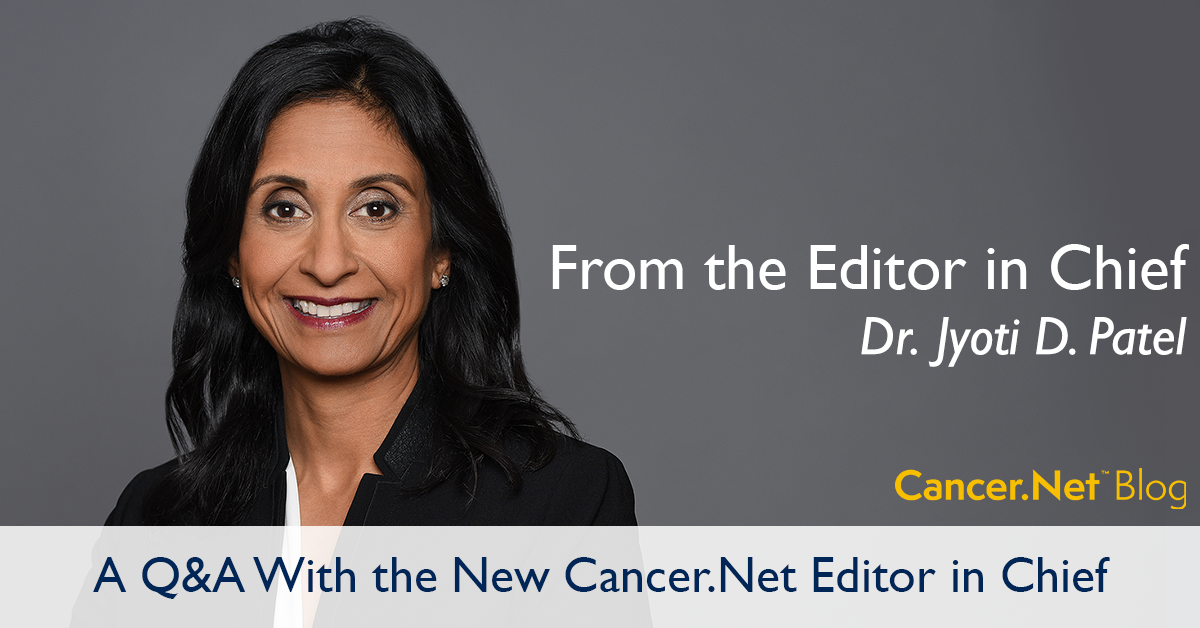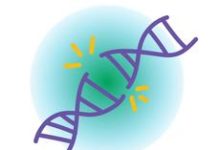
Last week, Jyoti Patel, MD, FASCO, began her term as Cancer.Net’s Editor in Chief. Dr. Patel is the Medical Director of Thoracic Oncology and Assistant Director for Clinical Research at the Lurie Cancer Center of Northwestern University. She also serves as Associate Vice Chair for Clinical Research in the Department of Medicine. Before being appointed as Editor in Chief of Cancer.Net, Dr. Patel was the Associate Editor for lung cancer on the Cancer.Net Editorial Board. Learn more about Dr. Patel and her vision of Cancer.Net’s future in this blog post. You can also follow Dr. Patel on Twitter.
Q: How did you become interested in cancer care?
Dr. Patel: I’ve found that oncologists tend to be drawn to the field by 1 of 3 influences: a fascination of cancer science and biology, mentorship that inspires a passion to study cancer, or the personal experience of seeing cancer’s toll. I am an oncologist because of all 3.
I grew up in a medical family; both of my parents were doctors. Soon after my family emigrated to the United States, my father, at the young age of 41, was diagnosed with pancreatic cancer. Treatments in 1978 were not effective, and he passed away soon after his diagnosis. Despite this tragedy, my mother continued to provide care for her patients, sometimes caring for multiple generations of a family. She was a role model both as a trusted physician who had long relationships with her patients and as single working parent raising 2 children.
Years later, when I started medical school at Indiana University, I was very fortunate to have Dr. Patrick Loehrer as my advisor. He is a great educator and clinician. His passion, his commitment to patients and their families, and his dedication to cancer biology inspired me to learn more about this disease that had so impacted my own life and family.
Then, once I started studying oncology, the science of cancer held my attention, captivating me and pushing me to understand more about the disease and the multitude of ways that cancer could overcome therapies. These 3 influences continue to motivate me today: cancer is deeply personal, we are always learning from our patients and colleagues, and our understanding of the science is always growing.
Q: What areas or issues in cancer care have you chosen to focus on in your research, and why?
Dr. Patel: I have focused my career on developing new treatments for lung cancer. In the early days, treatment of lung cancer only followed 1 path. We had few therapies, and they often came with significant toxicity or side effects. However, at the beginning of my career, highly effective targeted therapies were first being introduced, and some people with cancer benefitted greatly from these drugs.
Over the past 2 decades, we’ve seen significant improvements in therapies for our patients. This process has been especially gratifying because we’ve been able to marry clinical observation with science. We learn from our patients, observe outcomes from different interventions, and then try to understand the biology. We also do the reverse process in which we make a biologic observation and then bring it to the treatment clinic. This ability to move from lab bench to patient bedside has led to many new treatments, including in both targeted therapies and immunotherapies, and to significant improvements in survival. We have been able to personalize therapies based upon our understanding of the molecular drivers of cancer and a better understanding about the effectiveness of different treatments.
This combination of the right drug, for the right patient, at the right time has impacted all of us in the cancer field, but the growth of our understanding of lung cancer in the past 2 decades has been astronomical. It has revolutionized our approach to many other cancers as well.
Q: How do you think your background and experience will help you in your role as Cancer.Net’s Editor in Chief?
Dr. Patel: Cancer care is truly a partnership between providers and their patients. Because I’ve learned so much about cancer from taking care of my patients—from following my patients who volunteered to participate in clinical trials testing new drugs, to understanding side effects from established drugs, and even to seeing exceptional and unprecedented outcomes in particular groups of people with cancer—it’s important for me to give people with cancer the tools and resources they need to be full partners in this relationship. I know that everyone has a unique cancer experience, but sharing information about what we know lightens the burden for all of us. As Editor in Chief, I want to provide information and tools to people with cancer and caregivers so they feel empowered and knowledgeable as they manage their or their loved one’s illness.
Q: How have you seen Cancer.Net change over the past decade?
Dr. Patel: Since Cancer.Net’s inception, the world has changed significantly, and I think that Cancer.Net has evolved greatly. More information is digital than ever before, and knowledge has become more easily accessible as we’re sharing what we know in real time. As the fourth Editor in Chief of Cancer.Net, I’m following impressive leadership by Diane Blum, Dr. Bob Miller, and Dr. Lidia Shapira.
In the past decade, cancer care has seen a wide scope of changes. The number of available cancer therapies has grown immensely. Health care has become much more patient-centered and personalized. Cancer care teams have diversified and expanded to include a wider range of health care professionals. And today, aspects of survivorship are firmly entrenched in all stages of the cancer experience. The goal of Cancer.Net has been to develop easily accessible resources for people with cancer and caregivers to become knowledgeable and empowered so they can make decisions with confidence throughout these changes.
Moreover, as Cancer.Net has expanded its content, the impact has had a much more global reach. Over the past several years, we’ve worked to develop materials in different languages and to capture different cultural approaches to cancer care around the world.
Q: What are you most looking forward to in your role as Cancer.Net’s Editor in Chief?
Dr. Patel: As Editor in Chief, I’m excited to work with wonderful ASCO staff and volunteers who dedicate themselves to improving cancer outcomes for all. Developing resources for people with cancer and caregivers that are comprehensive, relevant, and timely enables us to partner effectively in this goal. At Cancer.Net, we strive to explain cancer diagnoses and implications for care in a way that we would explain to our own family and friends. I look forward to bringing the most current breakthroughs and perspectives to people with cancer and caregivers in a way that is easily accessible, regardless of where they’re at in their cancer experience.
Q: How would you like to see Cancer.Net grow while you are Editor in Chief?
Dr. Patel: I would like to see more multiplatform content delivery through podcasts, videos, and written content. I believe a personalized user experience so users can find content specific to them is also important. I also believe it’s essential to continue expanding Cancer.Net’s global reach. Cancer discoveries are happening at a dizzying pace in the 2020s, and it’s essential that Cancer.Net remains current, topical, and accessible.






